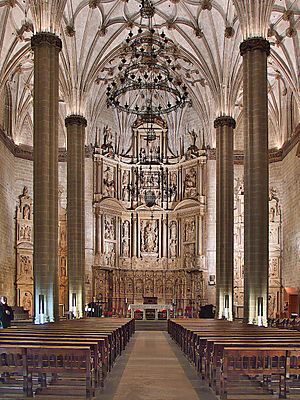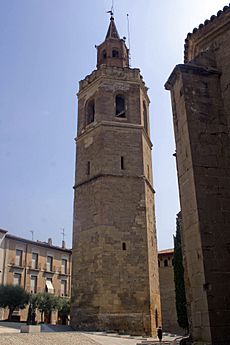Barbastro Cathedral facts for kids
Quick facts for kids Barbastro Cathedral |
|
|---|---|
| Cathedral of Saint Mary of the Assumption | |
| Catedral de Santa Maria de la Asunción | |

Central nave.
|
|
| 42°02′10″N 0°07′21″E / 42.0360°N 0.1224°E | |
| Location | Barbastro |
| Country | Spain |
| Denomination | Catholic |
| History | |
| Status | Cathedral |
| Dedication | Assumption of Mary |
| Dedicated | 1571 |
| Architecture | |
| Architect(s) | Juan de Sariñena, Juan de Segura |
| Style | Gothic |
| Years built | 1517—1533 |
| Administration | |
| Metropolis | Zaragoza |
| Diocese | Barbastro-Monzón (since 1995) |
The Barbastro Cathedral, also known as the Cathedral of Saint Mary of the Assumption, is a beautiful Roman Catholic church. It is located in the town of Barbastro, in the Huesca province of Aragon, Spain. Cathedrals are important churches that serve as the main church for a bishop's area, called a diocese.
Contents
A Look Back at History
The story of Barbastro Cathedral began a very long time ago. On May 5, 1101, a church was first built on this spot. It was built by Saint Poncio, who was the bishop of the area at that time. This first church was built where a mosque used to be.
Building the Current Cathedral
The church you see today was built much later, in the 16th century. Construction started in 1517 and finished in 1533. The main architects who worked on this project were Juan de Sariñena and Juan de Segura. Many other skilled people also helped to build this amazing structure.
In 1931, the Barbastro Cathedral was recognized as a national monument. This means it is a very important historical building for Spain.
Inside the Cathedral
When you step inside the cathedral, you'll notice some cool features. The tall, thin columns are very interesting. They have special tops called capitals, which are decorated with beautiful floral designs.
The main altarpiece is a large, decorated screen behind the altar. It tells stories from the Bible. This altarpiece shows scenes about the Assumption of the Virgin and the Passion of Christ. The bottom part is made of alabaster, a type of stone, and was carved in a style called Plateresque. This style is known for its detailed, jewel-like decorations. The upper part of the altarpiece was carved from wood between 1600 and 1602.
One of the chapels, the Chapel of San Jose, has an altarpiece dedicated to Saint Victorián. Some people believe this altarpiece was created by the famous artist Bartolomé Bermejo or his art studio.
The Chapel of Miracles
Another special place is the Chapel of Miracles, located in one of the southern parts of the cathedral. This chapel holds a much-loved wooden statue called the Santo Cristo de los Milagros, which means "Christ of the Miracles". This statue was carved by Enrique Monjó in 1939, right at the end of the Spanish Civil War. There is also a carving that remembers Blessed Florentino Asensio, a bishop who was martyred.
The Barbastro Cathedral is part of the Diocese of Barbastro-Monzón. This diocese also includes the co-cathedral in Monzón.
See also
 In Spanish: Catedral de Barbastro para niños
In Spanish: Catedral de Barbastro para niños
 | Bayard Rustin |
 | Jeannette Carter |
 | Jeremiah A. Brown |


